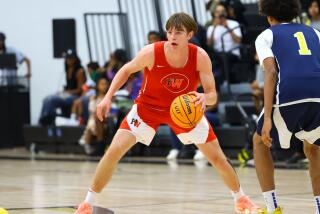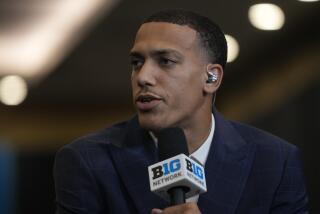Rising Sun Kevin Johnson Puts Free Time to Good Use
- Share via
SACRAMENTO — Think about how you would spend your time with an annual salary of approximately $2 million and a three-month summer vacation.
Since much of your nine working months is spent in tense situations, in front of adoring or booing crowds, maybe the first thing you would do is get away on a long cruise or a trip to a Caribbean or South Pacific island.
Kevin Johnson had these options and many more after last season’s surprising rise of his Phoenix Suns and their subsequent fall in the NBA’s Western Conference playoffs.
So what did he do? He came home to Sacramento to put in his nine or so hours a day, six days a week, in an attempt to ensure the start and finish of the construction of St. Hope Academy, his project for disadvantaged youth.
It is easy to see that this Sacramento High School (which retired his jersey Tuesday afternoon) and University of California graduate is not an average 24-year-old. Johnson is not even simply above average.
Michael Burstein, Johnson’s agent, said, “When Kevin was drafted, I told a guy from the (Sacramento) Bee that Kevin was the most mature person I’d ever met. He’s done nothing to change that.”
At an age when many search for direction and identity, Johnson leads and explains. When partying and hanging out are second only to hanging out and partying, Johnson’s priorities are reading and self-education.
Is this guy too good to be true?
“He’s getting there,” Burstein said. “It would be rough for me to say, but I wouldn’t disagree with it. He’s continually improving in every facet of life. He’s working harder on everything and focusing on those things that mean a lot to him.”
Johnson’s concerns about today’s youth are so strong that improving their chances for success rivals basketball on his personal ladder of life importance. And basketball holds lofty rung because it provides the means by which Johnson can make a difference.
St. Hope is not Johnson’s fulfillment of a childhood fantasy, although it would be symbolic if the academy provides a foundation and a birthplace for the dreams of others.
“I couldn’t see beyond playing baseball or basketball,” Johnson said about his youth. “That was all I knew, because I was really directed toward sports. What we’re really trying to do is open these kids’ minds to new horizons, allow them to see things they didn’t even know existed. They don’t understand -- and not just those kids, but a lot of people in general -- what it takes to have a happy home, why it is so important to have your own schools, or schools where you’re going to get taught a well-rounded education ... especially for black people.”
Johnson’s summer was spent well. After experiencing the realities of bureaucracy and red tape, the groundbreaking of the academy will take place in November with the building’s completion set for May.
St. Hope Academy is a youth organization whose aim is to help boys lacking the benefits of a traditional home life. This summer, 15 boys in elementary school, junior high and high school groups met from 9 a.m. to noon Monday, Wednesday and Friday at Sacramento High. They received tutelage in academic subjects, cultural awareness and character development.
Following the core-subject education, Johnson met with the individual groups once a week to conduct what he called St. Hope Rap Sessions.
In one session, he met his group of elementary school students, discussed many of the improper things Johnson had done in his life and compared that behavior to present lifestyles. They discussed why he did such things and why he doesn’t do them anymore.
Many of the boys were amazed to hear Johnson speak about how he lied and disobeyed teachers, parents and other authority figures. Eyes and mouths opened wide when Johnson spoke of how he consumed alcohol and marijuana before he realized that neither was doing him any good and both could cause him harm.
Johnson made sure to differentiate between the past and the present. He explained why he no longer acts improperly and focused on how many people may make poor decisions as children because of their immaturity, peer pressure and insecurities.
The students must adhere to an Academy code of conduct, which disallows chewing gum, disrespect for others and wild haircuts while encouraging positive conversation, honesty, humbleness, respect and fair play.
Students visited a variety of places in the afternoons as Johnson attempted to provide a diverse number of experiences. Mondays were designated for learning activity, and they might visit Sutter’s Fort, Old Sacramento or the Crocker Art Museum. Wednesdays were for community activity and projects, which could have been the Sacramento Children’s Home or the Youth Authority. Fridays were for fun, so a barbecue or a trip to Water World were possibilities.
The academy’s curriculum is Johnson’s creation, but he said the ideas are not original.
“I tried to steal as much as I could from different families,” said Johnson, who was raised by his grandparents. “I tried to look at why certain families have happy homes and are successful. I’ve seen a variety of families growing up and have been exposed to a lot of things that different families have done. That’s what I’m trying to bring to St. Hope
Burstein, who roomed with Johnson in college, said Johnson took on the shaping of the curriculum as he would a fourth-quarter fast break -- with fervor.
“He’s a voracious reader,” Burstein said. “He always has a book. When he put St. Hope together last year, he went to UC Berkeley and spoke with educators, he talked to people at the Boys Clubs of America, and he kept reading and reading until he became a mini-expert on education and on what it takes to get people to relate. This wasn’t something that just sprung out of his head.
“He knew he wanted to help youth in his neighborhood.”
Johnson said his curriculum deals only with the basics, so the foundation for more formal education will be established. One of his assets seems to be understanding the reach of his touch.
“With the core classes, we try to provide the liberal arts base,” Johnson said, “so in college you can do whatever you want. In cultural awareness, a lot of black kids need to feel better about themselves and about black people with the negative stereotypes portrayed, so we’re really trying to expose them to a lot of black historical figures.”
In the academy’s office is a drawing done by a youngster of black leaders Malcolm X, Harriet Tubman and Jesse Jackson. There are different pictures and inspirational messages from children and adults. Johnson’s attitude is portrayed through the words of one particular inscription.
“Be tender with the young, compassionate with the aged, sympathetic with the striving, and tolerant of the weak and wrong. Sometimes in life, you will have been all of these.”
But what Johnson wants most is the establishment of foundations for youngsters to grow up knowing they are capable of success while being people who can be proud of their actions.
“We want to teach them to be good people,” Johnson said. “We want them to be good citizens, and that’s far more important than anything.”
Johnson became a Christian at Cal and always recognizes how fortunate he has been with his basketball career and his ability to help others.
“That’s just God allowing me the opportunity to share the things I’ve learned and hopefully touch a lot of kids’ lives,” Johnson said. “I think naturally I’ll touch kids lives just by being a basketball player. But I want to affect their whole life in a much more positive, lasting way.”
Johnson said the specter of being a role model first became apparent while playing for Cal.
“I thought then that we, as athletes, have a tremendous platform where we can touch a lot of kids’ lives, even if we don’t do anything other than say hello,” he said. “I think that’s why I am so sensitive to kids. I remember when I was a kid and how much people I looked up to meant to me in my life. A wave, I could live off that. If I would go to a game and who was playing? Maybe Billy North or Bobby Bonds would look over or wave. Whoa, it meant so much.
“So when I got in the position, instantly my mind went back to those situations. I said I’m going to really try to overextend and let these kids know that I’m a person and I really care for them, and that if I made it, you can make it. Not so much basketball, but if I made it in anything, you can, too. Now I’m able to try and put it in a little more structured and organized manner, to try and share it with these kids.”
Johnson’s mother, Georgia West, said her son always has had a caring nature.
“He was always for the underdog,” she said. “Even in junior high, he’d help the other kids bat. He was a teacher-type. He’d take time to show the other kids. I don’t know if it was because he was an only child, but he’s always been a caring person and had a sharing personality.”
Patricia Burks is Johnson’s assistant at St. Hope. She wonders, albeit briefly, if Johnson is overextending himself.
“I’m always teasing him about how many hours he works,” Burks said. “I mean, if he wasn’t at the office, he was picking up the kids and taking them to play ball or bringing them over to his house or treating them to food or taking them to some elderly person’s house to help paint a fence or something.
“But I think sometimes it was something like that that helped him relax.”
Burstein said, “Last summer, I’d be getting calls from Kevin at the St. Hope office at 2 a.m. He’ll work six- and seven-day weeks. He’s so purposeful. Everything he does, there is a reason to it.
“It’s amazing. And during the season he keeps an eye on Sacramento. He probably does as many public appearances as any athlete during a season. But these things are relaxing to Kevin. ... He started preparing for 1990-91 five weeks from training camp. He’s got a balance.”
Basketball is the one conspicuous absence from St. Hope Academy. That is by design.
“One of the exciting things about this is we’re not doing anything on basketball,” Johnson said. “Where they can see me at my best or where I’d have the biggest impact is on the basketball court. But here they see me in a classroom and just as a person or a big brother, so to speak. That really gives them the right to question and challenge you and not respect you sometimes. That’s the fun part of dealing with these kids.”
More to Read
All things Lakers, all the time.
Get all the Lakers news you need in Dan Woike's weekly newsletter.
You may occasionally receive promotional content from the Los Angeles Times.








